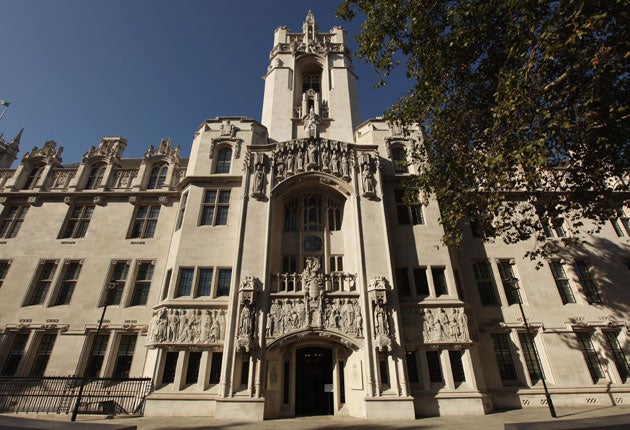Two murderers launch Supreme Court challenge for right to vote in prison

Two convicted murderers have taken their fight for the right to vote while in prison to the UK's highest court.
Seven Supreme Court justices are considering challenges by Peter Chester and George McGeoch at a hearing in London.
Chester, who is in his 50s, is serving life for raping and strangling seven-year-old Donna Marie Gillbanks in Blackpool in 1977.
McGeoch, from Glasgow, is serving a life sentence for the 1998 murder of Eric Innes in Inverness. He received a minimum term of 13 years, but due to subsequent convictions will not be considered for parole until 2015.
The panel of judges will hear argument on behalf of both men during a two-day hearing and submissions in response to the pair's appeals by the Attorney General Dominic Grieve.
Chester's challenge at the Supreme Court follows a decision by three Court of Appeal judges in December 2010 to dismiss his case.
At the start of today's proceedings, Aiden O'Neill QC, for McGeoch, told Lords Hope, Hale, Mance, Kerr, Clarke, Sumption and Hughes, that his arguments before the court were "based solely and squarely" on European Union (EU) law.
He said that although the case was not a "class action", it "may have implications" for others.
The European Court of Human Rights ruled in 2005 that a blanket ban on serving prisoners going to the polls was incompatible with the European Convention on Human Rights (ECHR), relating to the right to free and fair elections.
The court said it was up to individual countries to decide which inmates should be denied the right to vote from jail, but that a total ban was illegal.
The UK Government is expected to tackle the issue in a few months, but Prime Minister David Cameron has vowed inmates would not be given voting rights under his administration.
Mr Cameron has said that the idea of giving prisoners the vote makes him "sick" and told the House of Commons last year: "No-one should be in any doubt: prisoners are not getting the vote under this Government."
The hearing of McGeoch's case before the Supreme Court comes just days after a bid by two MSPs to give some prisoners the chance to vote in next year's Scottish independence referendum was defeated.
During the Court of Appeal hearing in Chester's case his lawyers argued that the serious nature of his offence did not justify disenfranchising him, and to do so was "disproportionate" and violated his human rights.
Chester, who is also known as Peter Chester Speakman, originally had his voting claims rejected by the High Court in 2009.
The Supreme Court is being asked to decide on whether European Union (EU) law gives convicted prisoners the right to vote in municipal and/or European Parliamentary elections.
In Chester's case the issue is whether the court should make a declaration that the statutory ban preventing him from voting is "incompatible" with his rights under the ECHR and with EU law.
Mr O'Neill told the Supreme Court the question was whether a British citizen could "claim EU rights against his own Government, in particular, voting rights".
He said: "The Government is bound to respect rights, including EU rights."
In written argument before the court Hugh Southey QC, representing Chester, said his case "concerns the right of convicted prisoners, and in particular, indeterminate sentence prisoners whose minimum terms (or tariffs) have expired, to vote in parliamentary and European parliamentary elections".
Mr Southey said: "The right to vote is a right of 'prime importance' in the ECHR and a right essential to the principle of democracy on which the European Union is founded."
Under the Representation of the People Act 1983, convicted prisoners are prevented from voting in parliamentary and local government elections - and under the European Parliamentary Elections Act 2002 a person is entitled to vote in European parliamentary elections if he is entitled to vote in parliamentary elections.
Chester's case concerns the "compatibility" of the relevant sections of those two Acts with the ECHR and EU law.
In November the Government published the Voting Eligibility (Prisoners) Draft Bill for pre-legislative scrutiny by a joint committee of both Houses.
It has put forward three options - a ban for prisoners sentenced to four years or more, a ban for prisoners sentenced to more than six months and a re-statement of the existing ban.
Join our commenting forum
Join thought-provoking conversations, follow other Independent readers and see their replies
Comments